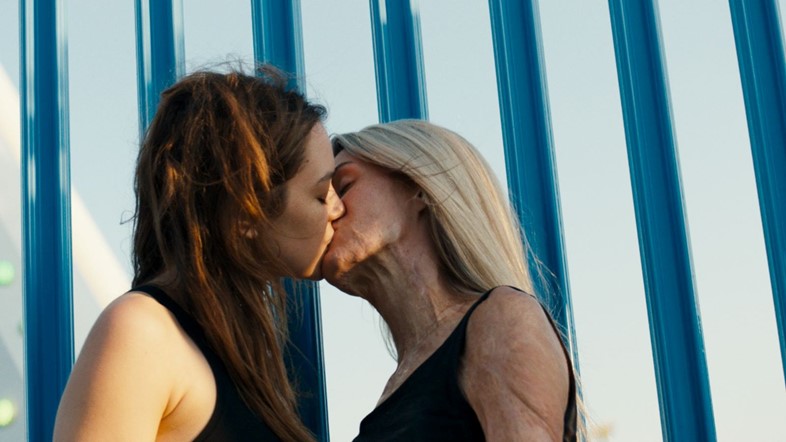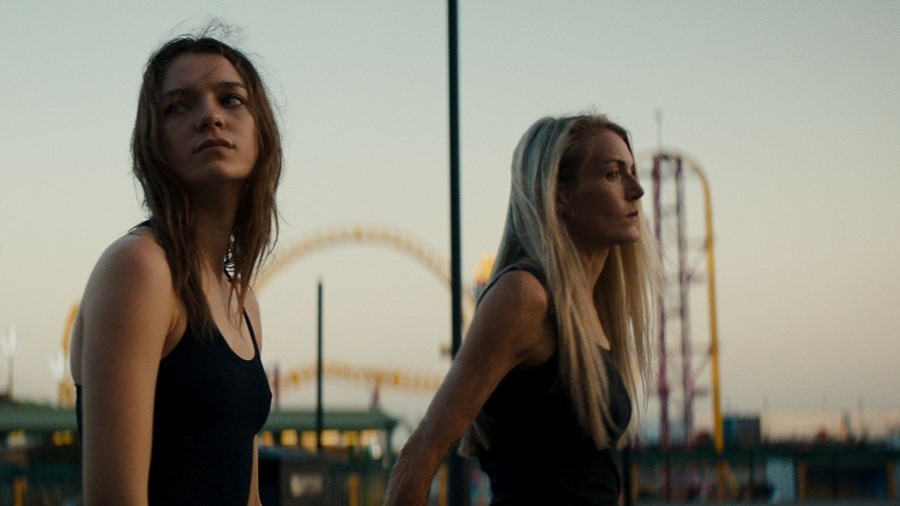As Silver Haze is released, director Sacha Polak and actor Vicky Knight talk about the deepening bond that inspired their second screen collaboration, and why it was important to present a “realistic” view of queerness
The stifling effects of deeply entrenched trauma drive Silver Haze, a compassionate and profoundly moving new film from writer-director Sacha Polak. When actress Vicky Knight says her character in the film, Franky, goes on “quite a journey”, she isn’t overselling it, but Polak’s poetic, partly improvised film is too rooted in real life to offer a pat happy ending. Franky isn’t just grappling with a devastating childhood accident, she’s also processing her own queerness and a toxic relationship with troubled Florence (Esmé Creed-Miles). “Franky is so full of anger, so it’s more a journey of her showing her strength and showing that she’s a loving person deep down,” says Knight.
Polak and Knight previously worked together on 2019’s Dirty God, the Dutch director’s astonishing English-language debut, in which Knight plays a young mother dealing with the aftermath of an acid attack that leaves her severely scarred. Polak cast Knight, a healthcare assistant with no prior acting experience, after auditioning her and other real-life burns survivors. As Dirty God began building a buzz on the festival circuit, the two women spent so much time together that Polak realised she wanted to tell another story based on Knight and the actress’s family.
“All the stories she told me were so funny and loving,” Polak recalls, speaking on Zoom from her kitchen. “And when I met Vicky’s family and saw the way she interacted with her sister, Charlotte, I thought, ‘OK, there’s a lot of drama in this family, but also a lot of humour and love.’” Polak was so taken with their sibling dynamic that she persuaded Charlotte, an acting novice, to appear in Silver Haze as Franky’s supportive sister Leah. Directing two members of the same family – one a newcomer to film-set etiquette – presented the director with some unusual challenges. “It was funny that Charlotte would sometimes, like, order Uber Eats during a scene,” Polak recalls with a laugh. “All of a sudden she’d be eating McDonald’s while we were shooting, not understanding that this wasn’t OK.”

Polak and Vicky Knight, who is speaking on Zoom from her own home, are clearly comfortable in one another’s company. Knight says Silver Haze’s story arose from “general chit-chat” and teases the director for “putting me in the sea” during filming “when she knows I can’t swim”. Still, Silver Haze required the actress to confront her own childhood trauma. When she was eight, Knight was rescued from a fire that destroyed her grandfather’s east London pub. She lost two cousins in the blaze and suffered burns to a third of her body. In Silver Haze, Knight’s character Franky was also badly burned in a pub fire, but Polak’s film is only loosely based on the actress’s life. The director was able to secure funding based on a 20-page treatment, which she says is “very unusual”, and wrote her script just “a couple of weeks” before filming. “I wanted to give the actors a lot of freedom, so it was very important that we had a small, almost documentary-style crew and lots of time to improvise,” she says.
Knight’s performance as Franky, a working-class east London nurse, is beautifully nuanced and believable. She treats her alcoholic mother with a kind of resigned kindness and fixates on Jane, her mother’s former best friend, whom Franky suspects of starting the fire and never owning up. These vengeful feelings are intensified by the fact Jane is now happily married to Franky’s father, whom she no longer talks to. Franky smokes weed to take the edge off – the film shares its name with a strain of marijuana – but finds greater solace when she meets Florence during a hospital shift. Charismatic but damaged, Florence is recovering from a suicide attempt, which brings out her caring instincts. “Franky wants to save everybody – she’s this unsung superhero who wants to get everyone out of danger,” says Knight. “But she hits a brick wall in her relationship with Florence because there comes a point where she can’t do any more.” In time, Franky finds her own saviour: Florence’s incredibly kind grandmother Alice (Angela Bruce), with whom she forms a chosen family in Southend, a seaside town that reminds her of childhood holidays.

Franky’s relationship with Florence is her first with a woman, but she embraces her sexuality pretty quickly. “I think she always knew, but was just confused about the way she could come out,” says Knight. Others are less accepting: her mother reacts with disgust, and Franky and Florence are harassed by people they know during a bus journey. This searing scene is also based on a real-life event, though not one experienced by Knight. In June 2019, two young women were homophobically attacked on a London bus after refusing to kiss for a group of male teenagers. “I’ve never felt uncomfortable with my sexuality – I’ll put it all out there,” says Knight. “But there are times where you do feel uneasy about holding your partner’s hand or kissing in public. That’s the society we live in, but I think it’s getting better.”
Presenting a “realistic” view of queerness – one that shows both the tough and joyful sides – was particularly important to Knight and Polak. “The editor who cut the film, who is gay, said this story needs to be seen because when she was young there were too few interesting films that she could actually relate to,” says Polak. But for Knight, it’s ultimately a film about love and human perseverance. “Franky and her family have been through a lot but they still come together in hard times,” she says. “And no matter what life throws at you, there’s always a way through. I think Franky shows us that it’s all about being your own hero.”
Silver Haze is out in UK cinemas from March 29.
